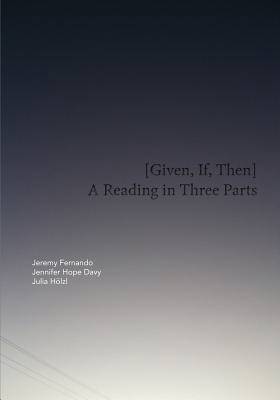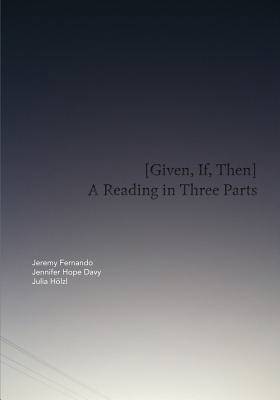
- Retrait gratuit dans votre magasin Club
- 7.000.000 titres dans notre catalogue
- Payer en toute sécurité
- Toujours un magasin près de chez vous
- Retrait gratuit dans votre magasin Club
- 7.000.0000 titres dans notre catalogue
- Payer en toute sécurité
- Toujours un magasin près de chez vous
[Given, If, Then]
A Reading in Three Parts
Jennifer Hope Davy, Julia Hölzl, Jeremy Fernando
Livre broché | Anglais
52,45 €
+ 104 points
Description
Joyous in the exploration of reading's impossibilities and the mystery of being exposed, there, before the unknown. Christopher Fynsk, Director of the Centre for Modern Thought, University of Aberdeen and Dean of Media & Communication, European Graduate School[Given, If, Then] attempts to conceive a possibility of reading, through a set of readings: reading being understood as the relation to an Other that occurs prior to any semantic or formal identification, and, therefore, prior to any attempt at assimilating, or appropriating, what is being read to the one who reads. As such, it is an encounter with an indeterminable Other, an Other who is other than other - an unconditional relation, and thus a relation to no fixed object of relation.The first reading by Jeremy Fernando, "Blind Reading," unfolds through an attempt to speak of reading as an event. Untheorisable in itself, it is a positing of reading as reading, through reading, where texts are read as a test site for reading itself. As such, it is a meditation on the finitude and exteriority in literature, philosophy, and knowledge; where blindness is both the condition and limit of reading itself. Folded into, or in between, this (re)reading are a selection of photographs from Jennifer Hope Davy's image archive. They are on the one hand simply a selection of 'impartial pictures' taken, and on the other hand that which allow for something singular and, therefore, always other to dis/appear - crossing that borderless realm between 'some' and 'some-thing.' Eventually, there is a writing on images on writings by Julia Hölzl. A responding to the impossible response, a re-iteration, a re-reading of what could not have been written, a re-writing of what could not have been read; these poems, if one were to name them such, name them as such, answer (to) the impossibility of answering: answer to no call.
Spécifications
Parties prenantes
- Auteur(s) :
- Editeur:
Contenu
- Nombre de pages :
- 116
- Langue:
- Anglais
Caractéristiques
- EAN:
- 9780692298374
- Date de parution :
- 30-01-15
- Format:
- Livre broché
- Format numérique:
- Trade paperback (VS)
- Dimensions :
- 178 mm x 254 mm
- Poids :
- 213 g

Les avis
Nous publions uniquement les avis qui respectent les conditions requises. Consultez nos conditions pour les avis.






